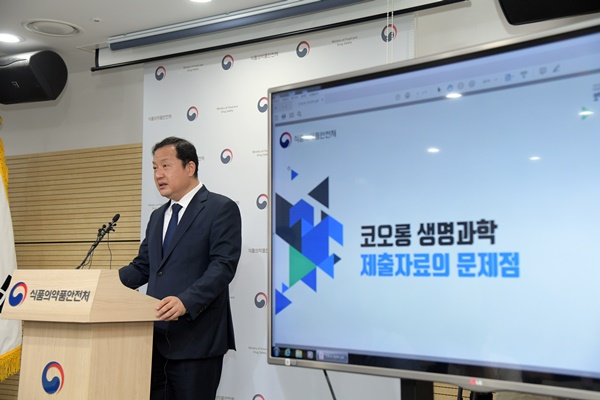The Ministry of Food and Drug Safety recently confirmed that Kolon Life Science fabricated data to win approval for the world’s first gene therapy Invossa-K. However, the regulator will not be free from charges of neglect of duty, observers said.
The ministry on Tuesday revoked Invossa license after confirming that the company had manipulated data submitted for the drug review. It also plans to file a complaint with the prosecution against Kolon for violating the Pharmaceutical Affairs Act.

Critics said the ministry should come under the prosecutors’ intense probe, however.
During the process of Invossa approval, the ministry changed one of the members of the Central Pharmaceutical Affairs Advisory Committee. The prosecutors should check if ministry officials abused power or neglected their duty during the process of granting the license for Invossa, critics said.
Earlier, activist group Free Medical Service Movement filed a complaint with the prosecution against the food and drug safety ministry.
Association of Physicians for Humanism, another civic group, also released a statement saying, “Prosecutors should investigate all ministry officials involved in clinical trials from phase-1 to phase-3 on Invossa and granting of approval.” The association also urged a reprimand on ministry officials for delaying the cancellation of Invossa license for the past two months.
Korea Alliance of Patients Organization said if the food and drug safety ministry knew that the second fluid’s cell ingredient was mislabeled or failed to find out about it due to inadequate monitoring, it was subject to abuse of authority or neglect of duty.
“The Board of Audit and Inspection should start an audit immediately and clarify whether the ministry gave special favor to Kolon to win Invossa approval,” it said.
The ministry denied allegations that it intentionally excluded some of the members of the Central Pharmaceutical Affairs Advisory Committee from the committee meeting to give the green light to the drug.
According to the ministry, it appointed 14 people as the committee members for a second meeting to review the approval of Invossa. Eleven of them attended the second meeting. Among the 11, four were existing panelists, four were advisers for review for approval of Invossa-K clinical trials in 2013, and the other three were new.
The ministry held two meetings for the drug approval review because “the review results for the drug’s clinical trials in 2013 conflicted with the results of the first meeting for the drug approval.”
When the panels reviewed Invossa for clinical trials, they concluded that the drug was valid as an osteoarthritis treatment if it showed improvements in joint functions and pain, even without improvement in cartilage structure.
However, in the first meeting for Invossa sales approval, they concluded that the drug could not recognize its efficacy only by symptom relief without the improvement of cartilage structure.
Kolon Life Science did not accept the ministry’s investigation results and said it would file an administrative lawsuit against the ministry for the nullification of Invossa license.
“Data for Invossa that we submitted in the development stage 17 years ago was insufficient according to our current standards. However, we neither fabricated nor concealed it,” Kolon Life Science said. “As the ministry did not accept our stance and revoked the license, we will take due procedures in response.”
The ministry said it would also actively respond to the company’s administrative lawsuit.

